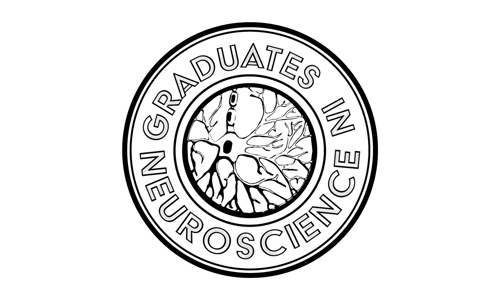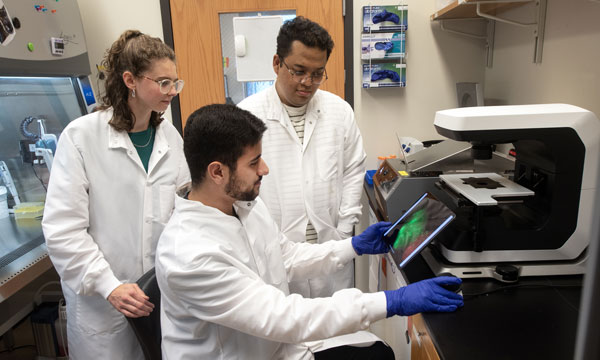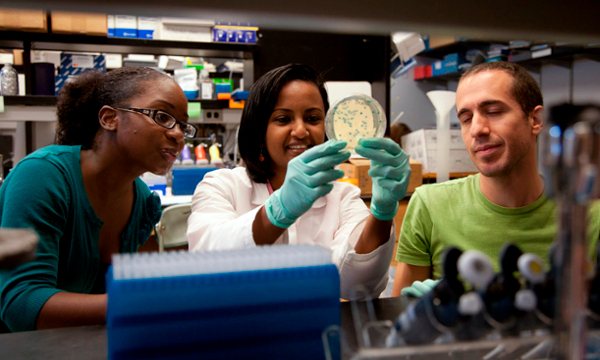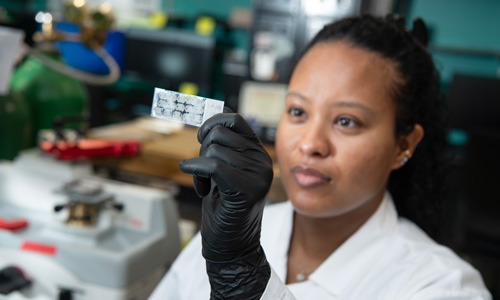Centers and Center Grants
Atlanta Clinical Translational Science Institute (ACTSI) is an inter-institutional magnet that concentrates basic, translational and clinical investigators, community clinicians, professional societies and industry collaborators in dynamic clinical and translational research projects. Emory has engaged two of its close academic partners in metropolitan Atlanta - Morehouse School of Medicine (MSM) and Georgia Institute of Technology (Georgia Tech) - to form the ACTSI. This partnership, a strategic multi-institutional alliance, offers compelling, unique and synergistic advantages.
The mission of the Atlanta Vision Loss Center (or, Center for Visual and Neurocognitive Rehabilitation) is to improve the everyday function and quality of life of aging Veterans with vision loss and their caregivers. This mission is accomplished by:
- Research directed toward a multidisciplinary understanding of the mechanisms causing and interacting with vision loss and then applying this understanding to develop creative interdisciplinary rehabilitative interventions.
- Incorporating these creative rehabilitative interventions into comprehensive rehabilitation that accounts for multifactorial disabilities associated with aging and common co-morbidities to improve everyday function and quality of life for the whole person.
- Evaluating the utilization, cost-effectiveness, and satisfaction associated with these interventions. Drs. Krish Sathian, Andrew J. Butler, Machelle Pardue, and Steven L. Wolf, all faculty members of the Emory Neuroscience Program, are key members of this Center.
The Center for Behavioral Neuroscience (CBN) is a National Science Foundation Science and Technology Center; an award-winning, interdisciplinary research consortium composed of more than 150 neuroscientists. The CBN was established in 1998 by a grant from the Robert W. Woodruff Foundation. In November 1999, the Center became one of the National Science Foundation's Science and Technology Centers and expanded to include seven institutions in Atlanta, Georgia (Georgia State University, Emory University, Georgia Institute of Technology, Morehouse School of Medicine, and the three schools in the Atlanta University Center: Clark Atlanta University, Morehouse College, and Spelman College) and other community partner organizations.
The CBN's original scientific focus was the neuroscience of social behaviors in the areas of affiliation, aggression, fear and reproduction and the emotional and regulatory processes that underlie them. In the intervening years, inclusion of additional behavioral neuroscientists at the participating institutions resulted in an expansion of the CBN's activities into the areas of memory, cognition, reward functions of the brain and positive emotional states. That process continues today as the CBN responds to the changing landscape of neuroscience and the evolving needs of its member institutions.
The CMBC's mission is to foster inquiry, research, and teaching from multiple explanatory perspectives concerning issues and phenomena associated with mind, brain, and culture, and their relationships. The Center's initiatives help to forge a larger community of scholars concerned with mind, brain, and culture at Emory, and to highlight and promote the important inquiry on these topics that already occurs at Emory. Many neuroscience program faculty are members of this Center.
Based on the outstanding strengths of Emory's neuroscience community and the campus-wide interest in neurodegenerative disease research, in 2001 the Emory University School of Medicine created a Center for Neurodegenerative Disease (CND). Interdisciplinary and interdepartmental, the CND fosters and integrates studies on the mechanisms of neurodegeneration, neuroprotection, and brain repair. It has successfully built on existing strengths in the basic and clinical neurosciences, with the ultimate goal of creating a well-funded, internationally recognized center of excellence to serve as a focal point for research, teaching, and experimental therapeutics. The CND provides an optimal environment for translational research, bringing together in one place faculty with diverse basic and clinical expertise. This enhances the interactions between basic scientists and clinician-scientists that are essential for understanding disease mechanisms and for developing new therapies. The CND holds a weekly seminar series that is very well attended by many neuroscience graduate students interested in neurodegenerative diseases and translational neuroscience research.
The Center for Translational Social Neuroscience (CTSN) promotes innovative research and training that advances our understanding of the social brain. The Center's initiatives foster intellectual exchange and collaboration among a diverse community of researchers and clinicians investigating the neurobiology of prosocial behavior and disorders of the social brain. The Center is committed to translating discoveries made in the laboratory into strategies for improving social function in psychiatric disorders where social disruption is a core symptom, such as Autism Spectrum Disorder and Schizophrenia.
The Emory ADRC is one of 29 Alzheimer's disease centers funded by the National Institute on Aging at the NIH. The ADRC supports three research projects and also provides core resources that serve as the foundation for multidisciplinary research activities and education. The research projects are led by Neuroscience Program faculty (Drs. Stuart Zola, Junmin Peng, Allan Levey, and Jim Lah), involving cognitive neuroscience, proteomics, and genetics approaches to AD. The Education Core coordinates training opportunities for graduate students, medical students, health professionals, and the community to increase knowledge and awareness of neurodegenerative disease. It also includes a clinical, neuropathology, and data management core that tremendously benefits faculty, graduate students, and postdocs with interest in neurodegenerative disease. Dr. Allan Levey, chairman of Neurology and active member of the Neuroscience Program, serves as Center Director.
"Mechanisms of Risk and Resilience in Autism Spectrum Disorders (ASD): Ontogeny, Phylogeny, and Gene Disruption"
The Emory Autism Center of Excellence (ACE) (ACE Brief Overview (PPT)) was created by an 8.5 million dollar grant award from the National Institutes of Mental Health as a collaboration between the Marcus Autism Center and Emory National Primate Research Center. There are only 3 such Centers in the country. The ACE deploys novel technologies and highly quantitative methods to study the social brain in human infants and infant rhesus monkeys via brain-behavior studies of social engagement, and includes the earliest treatment trial beginning at the age of 12 months. A priority is to develop community-viable early identification and treatment to allow children with autism to realize their full potential while minimizing the potentially devastating impact of autism on cognitive, language and behavioral development, burdens that represent a significant challenge to families and society in general.
The Emory ACE brings together 5 laboratories in 3 highly interconnected institutions (Emory University School of Medicine, Emory National Primate Research Center, and Children's Healthcare of Atlanta). These laboratories combine unique strengths and are ideally situated to synthesize efforts towards translational research and community outreach. Several Project PIs are prominent neuroscientists new to the field of autism research. They all join in a concerted effort to investigate developmental gene-brain-behavior relationships in infants at risk for autism and in primate model systems as an inroad into the pathophysiology of autism within a highly synergistic systems social neuroscience enterprise. This initiative aims to generate transformative scientific discoveries while creating a new community-based system of healthcare delivery for infants toddlers with autism spectrum disorders and their families.
Emory's Mind-Body Program, developed in the Department of Psychiatry and Behavioral Sciences, is a central resource for individuals interested in clinical and basic science research on mind-body interactions. Investigators in this program are mainly interested in interactions between the brain, endocrine system, and the immune system, especially as they relate to the effects of stress on the immune system and the role of the immune system in behavioral alterations including depression, fatigue, and cognitive dysfunction. This program is supported by various private organizations and individuals, and by the Emory-Tibet Partnership. Dr. Andrew Miller, a faculty member in the Neuroscience Program, is a key founder and member of this program.
In 1997, Emory University and the Georgia Institute of Technology joined forces in the genesis of a new, joint Biomedical Engineering department. The development of this new department followed 10 years of collaborative effort between the two universities, beginning in 1987 with the establishment of a joint biomedical technology research center. In 1995, Emory and Georgia Tech established a joint M.D./Ph.D. program, under which the M.D. is received at Emory and the Ph.D. in bioengineering is awarded by Georgia Tech. Several Neuroscience training faculty are part of the Biomedical Engineering Department. This close interaction between Emory University and Georgia Tech provides great structural and intellectual resources for Neuroscience students interested in neuroengineering, neuronal modeling, computational neuroscience, etc. It also provides graduate students in the Emory Neuroscience Program or the Emory/GA Tech Biomedical Engineering (BME) Program the opportunity to take cross-disciplinary courses that are not offered in their respective institution. For instance, at least 7-10 BME students enroll each year in the Neuroanatomy and Systems Neuroscience course (IBS 526) and in the Cellular and Developmental Neuroscience course (IBS 514) at Emory University.
The Neuroethics Program is an interdisciplinary, inter-departmental group of scholars interested in the intersection of neuroscience, ethics, and society. Under the direction of Dr. Karen Rommelfanger, an Emory Neuroscience Graduate Program alumnae, the Neuroethics Program aims to become a center of excellence that informs responsible applications of neuroscience in research, the clinic, and society as well as engages and activates our community in neuroethics discourse. The Neuroethics Program organizes annual symposia, graduate courses, and the Neuroethics Neuroscience in the News journal club. The Program also offers Neuroethics Scholars Program Fellowships and maintains the Neuroethics Blog, the official blog of the International Neuroethics Society's American Journal of Bioethics Neuroscience.
The Neuroethics Program is part of the Emory Center for Ethics, an international leader in the exploration of ethics directed by Dr. Paul Root Wolpe one of the founders of the field of neuroethics. The Center is dedicated to exploring how ethical issues underlie the decisions that shape our minds, lives, and society. The Center serves as a resource and gathering place for scholars from across the university, hosts public programs, partners and consults with private and public community organizations, and teaches students at every level of university life. The Center is committed to asking tough questions and developing strategies to help enable people and organizations put ethics into practice.
The Conte Center for Oxytocin and Social Cognition, an NIMH funded Center established in 2013, is focused on understanding the neural mechanisms by which oxytocin affects social cognition. Oxytocin increases affiliative behavior, maternal nurturing and social bond formation in animal models. In humans, oxytocin increases trust, attention to the eyes of others, empathy and the ability to infer the emotions of others. Oxytocin also improves some aspects of social functioning in individuals with autism spectrum disorder (ASD). Conte Center investigators are testing the hypothesis that oxytocin increases the salience of social stimuli and the rewarding aspects of social interactions by modulating the communication between key brain areas.
Center investigators are using monogamous prairie voles, a rat model of autism and rhesus macaques to explore how oxytocin modulates communication between the brains reward centers and social information processing regions, e.g. amygdala. These animal projects are complemented with studies in collaboration with the Emory Autism Center comparing the effects of intranasal oxytocin on social cognition and brain functional connectivity in health and ASD human subjects. Sophisticated in vivo electrophysiological recordings, cognitive assays and functional fMRI are being used to elucidate the impact of oxytocin on social cognition and neural communication. Center investigators include Larry Young, Robert Liu, Lisa Parr, James Rilling, Joseph Cubells, and Mar Sanchez.
The Center provides training opportunities in electrophysiology, behavioral pharmacology, functional neuroanatomy, molecular biology, cognitive testing and brain imaging. The Conte Center organizes monthly seminars on the neurobiology of social cognition and autism.
The Wesley Woods Health Center building houses the clinical programs for Cognitive Neurology and Movement Disorders in the Department of Neurology. The Health Center building also houses the Emory ADC Clinical and Education Cores. Wesley Woods is well known for its inpatient, outpatient, and day hospitalization programs in depression, Alzheimer's disease, Parkinson's disease, Huntington's disease, sleep disorders, and rehabilitation. The Neuroscience graduate students are invited to join a series of clinical video conferences organized at Wesley Woods every other week by the movement disorders group in the Neurology Department to gain some exposure to the clinical features and complex symptomatology of various movement disorders. This represents an additional effort the Neuroscience Program is making to develop translational education initiatives that help Ph.D.s better translate their basic bench work to patients' bedside.
The Emory National Primate Research Center is the oldest scientific institution dedicated to primate research in the U.S. The primate colony at the center totals over 3,000 animals representing 14 species and includes a nearby Field Station with over 300 births each year. There has been a dramatic growth in neuroscience research at the center over the past five years and this growth recently received further support by the recent opening of the Neuroscience research building. Currently, 26 members of the neuroscience training faculty have their laboratories at the Emory National Primate Research Center, which represents a 300% growth over the past ten years. Most of these faculty are part of the Neuroscience Research Division directed by Dr. Michael J. Kuhar, a world expert in the field of drug addiction.
It is also important to note that the leadership of the Center for the past ten years has been under the command of two outstanding neuroscientists: Dr. Thomas Insel (1994-1999; now Director of NIMH) and, since, 2001, Dr. Stuart Zola, a well-established neurobiologist who has made major contribution in the field of learning and memory in primates. Since the Emory National Primate Research Center is an integrative component of the School of Medicine, all faculty members hold joint academic appointments with one or more School of Medicine Departments. The neuroscience research going on at the center is highly diversified, ranging from studies of drug addiction to molecular mechanisms of social behavior, movement disorders, as well as visual, oculomotor, and cognitive neurosciences. The Emory National Primate Research Center provides outstanding pathology and veterinary resources to support these studies.
With its animal resources and expertise, the center represents a major asset for trainees in the Neuroscience Program. The Division of Neurosciences at the center supports an annual seminar series through which 6-8 national and international speakers are invited to participate. In order to facilitate trainees' interactions with the speakers, a lunch is usually organized between graduate students and postdoctoral fellows with the faculty guest on the seminar day.








